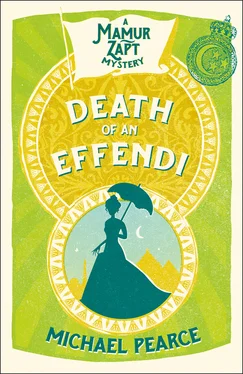‘Yes.’
‘Seeing that he does not find out too much?’
The conciliating laugh took the sting out of his words.
‘Helping him.’
‘I am sure he will need help. With so many obstacles in his way.’
‘Are there?’
‘Well, yes, Captain Owen. You know that as well as I do.’
‘What sort of obstacles?’
‘The usual ones. The ones that always block Egypt’s attempts at freedom.’
‘The Capitulations, you mean?’
‘Exactly.’
‘I am not sure they are relevant here.’
‘No?’
‘In any case,’ said Owen, ‘there’s not a lot I can do about them.’
‘Perhaps not. But, you see, Captain Owen, if you were really helping Mr El-Zaki, it would make his task a great deal easier. That is why I asked what was your role in the case.’
‘Why are you interested in Tvardovsky?’
The journalist spread his hands.
‘The general good, Captain Owen. The general good. This is a sad loss to Egypt.’
‘A sad loss?’
Es-Rahel caught the note of incredulity and stared.
‘Why, yes, Captain Owen. Mr Tvardovsky was a man who might have done a great deal for Egypt.’
‘That was the point of the gathering, certainly.’
‘Ah, yes, but you know how these things go. So many people there who were not really interested in Egypt, interested only in how much money they could make out of it. Mr Tvardovsky was not like that.’
‘You knew Tvardovsky?’
‘Of course.’
‘Of course?’
‘We journalists mix in a variety of circles.’
‘Including that of millionaire financiers?’
‘Well, perhaps not directly,’ the Egyptian admitted. ‘But we do sometimes meet them in other circles.’
‘Such as?’
‘Émigré ones.’ Mr es-Rahel smiled. ‘Radical ones, Captain Owen. But then, the Mamur Zapt wouldn’t know about that sort of circle, would he?’
Mahmoud joined them.
‘Ah, Mr El-Zaki!’ said the journalist warmly. ‘And how are you getting on with your inquiries? Successfully, I hope. Mr Tvardovsky was such a sad loss to us all!’
Mahmoud looked at him distrustfully.
‘Mirza es-Rahel,’ said the journalist, shaking hands.
‘He works for Al-Liwa ,’ said Owen.
‘Oh.’
Mahmoud was not on easy terms with the press. Partly it was his natural caution. As a Parquet lawyer, Mahmoud had had too much experience of journalists not to know that anything he said would be taken down and used in evidence against him. But partly, too, it was a slightly puritanical dislike of their overstatement and distortion. Why couldn’t they just put it down straightforwardly and rationally – like a law report, for instance?
‘I was just urging Captain Owen to give you all the help he could,’ said es-Rahel.
‘Oh, yes?’ said Mahmoud distantly.
‘I am afraid you will need it,’ said the journalist, ‘with all there is ranged against you.’
‘Oh, yes?’
‘You can, of course, count on our support. But in a case like this the Mamur Zapt’s support, if indeed, you have it, will count far more.’
‘Well, thank you,’ said Mahmoud.
For Mahmoud, as for most Cairenes, Africa began one mile south of Cairo. In the wilderness that was the provinces, what hope was there for observance of proper procedure? For efficiency and competence of any sort? For rationality itself?
‘Be fair!’ remonstrated Owen. ‘He’s only a Mudir. And when he’s up against someone like Prince Fuad —’
‘That is true. It is wrong for me to blame the ones lower down when it is those at the top who are at fault. What you said is true. It is not the Mudir who is to blame, it is those who have made him what he is!’
He brought his fist crashing down on the table. A waiter, misunderstanding, hurried to replenish their coffee pot.
‘It is not the man who is at fault, it is the system. The Pashas, with their interest in keeping people ignorant, the Khedive, the British—’
‘Quite right!’ said the waiter warmly.
‘What?’
Caught off balance, Mahmoud stared up at him.
‘It’s what I always say myself.’
It was the waiter that Owen knew, the one he had had his long conversation with on the occasion of his previous visit to the hotel, that morning when the financiers had been talking under the trees and he himself had been sitting, then as now, up here on the terrace.
‘It’s the rich man that gets syrup on his figs, the poor man has to do without.’
He poured them some coffee.
‘Take this coffee, for instance. Do you think I get coffee like this? Well, I do, as a matter of fact, because I work in the hotel now and we help ourselves. But when I’m at home, do you think I drink like this? No, it’s bitter black tea for me, and that’s the way it is with the world. The rich get what’s going and the poor are left to fend for themselves.’
‘Yes, well—’
The waiter dropped on to his heels, part of the conversation now.
‘Take that foreign effendi, the one who was shot. Did the Mudir want to know? Not a bit of it. In fact, the less he knew about it, the better. But when my sister’s son was caught stealing grapes, the Mudir was on to him in a flash. “It’s you for the caracol,” he said. Caracol! What did he want to put him in the caracol for, for a thing like that? A clip over the ear would have done. Or a touch of the stick, like the old Mudir used to do. “You’re making him a criminal,” I said. “I’m bloody stopping him from becoming one,” the Mudir says. Well, that’s all very well, but what about those rich men who were here the other day? They were stealing grapes if anyone was. But was anybody doing anything about them? Well, maybe someone was, for one of them got shot, didn’t he? Though he was the wrong man and they should have shot someone else—’
‘Just a minute,’ interrupted Owen: ‘Why? Why was he the wrong man?’
‘Well, he was all right, wasn’t he? A bit lacking in the brain-pan, perhaps, the way he talked sometimes and the way he poked around in places, but harmless. You could see he meant well. When he went into shops or the bazaar he used to talk to people—’
‘Shops?’ said Owen. ‘Bazaar? Where was this?’
‘Medinet. He used to go there regularly. There was an old woman he used to stay with. As batty as he was. Foreign, of course, like him. Well, you can’t get away from them, they’re everywhere in Egypt. But—’
‘He’d been here before?’
‘Not here. Medinet. And over at Lahoun. He was always over there at the Labyrinth. Wouldn’t have been surprised if a crocodile had had him one of these days, if half what they say is true.’
‘What do they say?’
‘They say they haven’t gone, you know.’
‘They—?’
‘The crocodiles. They say they’re still there somewhere. Tucked away underground in that Labyrinth. And they’ll have you as soon as look at you if you don’t watch out. People wandering around on their own. Like him. Tempting fate. Though fate’s a funny thing, isn’t it? It wasn’t the crocodiles that got him in the end. Although what happened to the body? They say that daft Mudir gave it away. You can never be sure about these things. Maybe the crocodiles did get him after all. A pity, though, it was him and not one of the others. Everybody knew him and—’
‘Everybody knew him?’ said Mahmoud later, as they climbed up into the carriage that was taking them back to the train.
Medinet spread along both banks of the Bahr-el-Yussuf. If it was a canal, as some argued, it was an unusual one, for the water rushed along it as swiftly as in a river. The current was so powerful that the water-wheels which fed the town were worked directly by it. The houses, too, were interesting, many of them as grand as Cairo Mameluke houses, with stuccoed fronts and graceful balconies trailing roses and figs and vines.
Читать дальше












